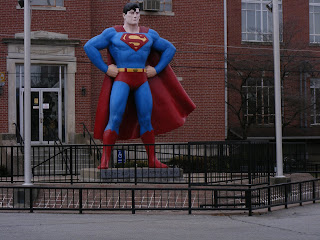 On Tuesday, we visited the giant superman statue in Metropolis, IL. Later that day, we visited Nashville's replica of the Greek Parthenon. While this is a noteworthy pair in part because the two are both shining examples of cheesy middle-American pop architecture, it speaks to something deeper within the American Psyche. Both Superman the Greek Gods celebrated in a roundabout way by Nashville's Parthenon derive significance from their superior abilities. But why do Americans see the worship of these super-figures as desirable?
On Tuesday, we visited the giant superman statue in Metropolis, IL. Later that day, we visited Nashville's replica of the Greek Parthenon. While this is a noteworthy pair in part because the two are both shining examples of cheesy middle-American pop architecture, it speaks to something deeper within the American Psyche. Both Superman the Greek Gods celebrated in a roundabout way by Nashville's Parthenon derive significance from their superior abilities. But why do Americans see the worship of these super-figures as desirable?The term "Superman" can be traced back to Friedrich Nietzsche (incidentally, an admirer of Emerson) who advocated that the worship of the "Übermensch" was man's end in life: "I love those... who sacrifice themselves to the earth, that the earth may one day belong to the übermensch". In the early 20th century, English editions of Nietzsche's writing translated übermensch into English as "Superman". By the time Nietzsche wrote this, the United States had already built a culture around what would later be termed "rugged individualism", celebrating their anti-authoritarian government and praising individualist writers like Horatio Alger. While Nietzsche's pronouncement that "God is dead" didn't sit well with American's tendency toward religion, his message of individualism resonated here, first exerting an influence on playwright Eugene O'Neill, then figuring more heavily into the writings of Russian immigrant Ayn Rand. Though it was later argued that "overman" was a better translation of "übermensch", the Superman comics were created while "superman" was still the most current translation of the term. Whether or not the creation of the "Man of Steel" was in fact influenced by Nietzsche is debatable, however, Metropolis's shrine to him is an eerie fulfillment of superman worship.
 But this shrine, along with its Tennessee companion which celebrates superhuman Greek Gods, raises a problem. The two monuments aim to incite worship to individuality, the highest American ideal. But on further reflection, the very act of worship is contradictory to individuality. It's true that Zeus or Superman have superior strength, and the logic goes that as paragons of individuality, we are sworn not to make laws or create societies which would restrict their awesome power. As the "untermench" - the subhumans - we must emulate these figures, for there is no other path in life than to follow in the footsteps of Superman, which is especially difficult since Superman flies everywhere.
But this shrine, along with its Tennessee companion which celebrates superhuman Greek Gods, raises a problem. The two monuments aim to incite worship to individuality, the highest American ideal. But on further reflection, the very act of worship is contradictory to individuality. It's true that Zeus or Superman have superior strength, and the logic goes that as paragons of individuality, we are sworn not to make laws or create societies which would restrict their awesome power. As the "untermench" - the subhumans - we must emulate these figures, for there is no other path in life than to follow in the footsteps of Superman, which is especially difficult since Superman flies everywhere. As someone who has flirted with Libertarianism in the past, the idea of individualism is something I take seriously. Hero worship degrades our individualism by imposing orthodoxy and discouraging diversity of thought. It creates an implied collective, in this case, those who would be just like Superman if they could. Real individualism is doing what you want with due respect to others in society, not accepting an ideal as dictated to you by an external source. Real world "heroes" may exist, and they deserve our respect, not our worship.
But as I witnessed today, the Superman ideal (or the Zeus ideal) is alive and well in the American heartland. While I hope Middle America can be weaned off the worship of Supermen, I do appreciate the fact that Superman and Zeus have great entertainment value. Maybe we should give these shrines the benefit of the doubt, and assume that they are merely recognitions of the fact that those who created these fictional characters know how to tell a good story.
And yet, the superman






No comments:
Post a Comment